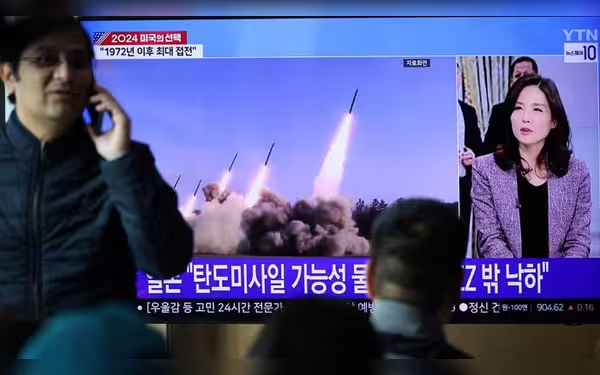Saturday, November 16, 2024 09:20 PM
North Korea's GPS Interference Disrupts South Korean Navigation
- North Korea's GPS jamming affects ships and aircraft.
- South Korea warns of increased navigation risks.
- Tensions escalate amid North's provocative actions.
 Image Credits: thenews
Image Credits: thenewsNorth Korea's GPS interference disrupts navigation for ships and aircraft, escalating tensions with South Korea amid ongoing provocations.
In recent days, tensions on the Korean Peninsula have escalated, particularly due to North Korea's actions that have raised alarms in South Korea. On Friday and Saturday, North Korea conducted GPS interference, which significantly impacted the operations of ships and private aircraft in the region. This interference has prompted South Korea's military to issue warnings to those navigating the West Sea area, advising them to exercise caution.
The Joint Chiefs of Staff (JCS) of South Korea have expressed serious concerns regarding this latest provocation. They have urged North Korea to cease its GPS signal jamming immediately, emphasizing that the North will be held accountable for its disruptive actions. The Global Positioning System (GPS) is crucial for navigation, relying on a network of satellites and receivers to provide accurate location information. Disruptions to this system can lead to dangerous situations, especially in busy air and sea traffic.
The backdrop to this situation is a series of escalating tensions between North and South Korea. Since late May, North Korea has been sending balloons filled with trash into South Korean territory, a move that has been met with strong disapproval. In response, South Korea has resumed its loudspeaker propaganda broadcasts, further intensifying the already strained relations. Aviation experts have noted that the combination of North Korea's trash balloon campaign, missile launches, and the recent GPS spoofing incidents have created a more hazardous environment in South Korean airspace. This has complicated airline operations and raised the stakes for both nations.
According to the South Korean government, between May 29 and June 2, approximately 500 planes and numerous ships experienced GPS-related issues. In light of these disruptions, South Korea has lodged a complaint with the United Nations aviation body, ICAO, which has also warned North Korea to halt its interference activities.
As the situation continues to unfold, it is essential for both nations to seek dialogue and resolution rather than escalating tensions further. The safety of civilians and the stability of the region depend on responsible actions from both sides. Understanding the implications of GPS interference is crucial, as it not only affects military operations but also the everyday lives of people who rely on accurate navigation for travel and commerce. The hope remains that diplomatic efforts can prevail, leading to a more peaceful coexistence on the Korean Peninsula.













